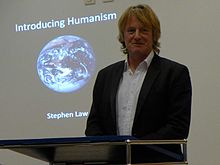Loading AI tools
British philosopher (born 1960) From Wikipedia, the free encyclopedia
Stephen Law FRSA (born 1960) is an English philosopher. He is currently Director of the Certificate of Higher Education and Director of Philosophy at The Department of Continuing Education, University of Oxford. Law was previously Reader in Philosophy and Head of Department of Philosophy at Heythrop College, University of London, until its closure in June 2018. He also edits the philosophical journal Think,[1] which is sponsored by the Royal Institute of Philosophy[2] and published by the Cambridge University Press. He is a Fellow of The Royal Society of Arts and Commerce and in 2008 became the provost of the Centre for Inquiry UK.[3] In 2023 he became a fellow with the Committee for Skeptical Inquiry.[4]
Stephen Law | |
|---|---|
 Law in 2014 at the Forschungsinstitut für Philosophie Hannover | |
| Born | 12 December 1960 Cambridge, England |
| Alma mater | |
| Era | Contemporary philosophy |
| Region | Western philosophy |
| School | Analytic philosophy |
| Thesis | Reference, essence and natural kinds (1995) |
Law was born 12 December 1960 in Cambridge, England, and attended Long Road Sixth Form College in Cambridge. However, having been "asked to leave",[5][6] he began his working life as a postman. At 24 he successfully managed to persuade City University in London to accept him for the BSc in philosophy, despite his lack of A levels. There he managed to achieve a first-class honours, allowing him to move on to Trinity College, Oxford, to read for a BPhil in philosophy. He was also for three years a junior research fellow at The Queen's College, Oxford, where he obtained a doctorate in philosophy. Law lives in Oxford, England, with his wife and two daughters.
Law has published both a variety of academic papers and more popular, introductory books (including three children's philosophy books). Law has debated many Christian apologists and theologians. He developed the Evil God Challenge thought experiment.[7][8]
Seamless Wikipedia browsing. On steroids.
Every time you click a link to Wikipedia, Wiktionary or Wikiquote in your browser's search results, it will show the modern Wikiwand interface.
Wikiwand extension is a five stars, simple, with minimum permission required to keep your browsing private, safe and transparent.